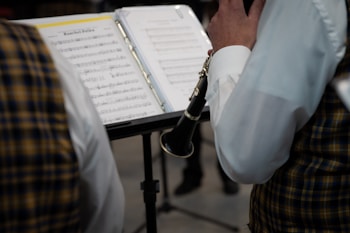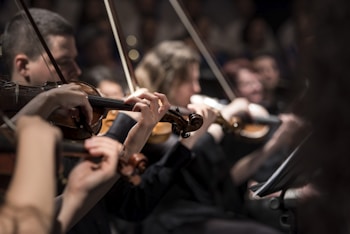 Music and Dance Collection
Music and Dance Collection
A collection of Spanish words related to the themes of music and dance.
cantante
'Cantante' refers to a person who sings, either as a job or as a hobby. It's a gender-neutral term.
Example sentences with cantante →cantar
Cantar means to sing in Spanish. It can be used when a person or a group of people are singing, whether it's a song, hymn or tune.
Example sentences with cantar →cantar a todo volumen
The Spanish phrase 'cantar a todo volumen' translates to 'singing at full volume' in English. This phrase is often used in contexts where someone is singing loudly, typically as loud as they can. It's important to understand the literal translation of each word; 'cantar' means 'to sing', 'a todo' means 'at all' or 'in full', and 'volumen' means 'volume'. Therefore, the phrase 'cantar a todo volumen' can be appreciated for having a clear and direct translation to English.
Example sentences with cantar a todo volumen →
cantar al compás (de la música)
cantar en directo
The Spanish phrase 'cantar en directo' translates to 'live singing' in English. This phrase is commonly used in relation to performances and concerts, where the vocalist or musician performs their music in real time, face-to-face with their audience. Unlike recorded music, live singing involves direct audience engagement and can convey deeper emotion. 'Cantar en directo' captures the excitement and immediacy of these spontaneous and unedited moments in music.
Example sentences with cantar en directo →cantar en un auditorio
The phrase 'cantar en un auditorio' in Spanish translates to 'singing in an auditorium' in English. Singing refers to the act of producing musical sounds with the voice, usually in a structured and continuous manner. An auditorium, on the other hand, is a large room or hall where people gather to hear speeches or watch performances. Thus, the phrase 'cantar en un auditorio' entails performing vocal music for an audience in a large room or building designed for such events.
Example sentences with cantar en un auditorio →cantar en vivo
The Spanish phrase 'cantar en vivo' translates to 'sing live' in English. This phrase is commonly used to talk about musicians or artists who are performing their song vocally in front of an audience at that very moment, as opposed to delivering a prerecorded performance. 'Cantar' means 'to sing,' 'en' means 'in,' and 'vivo' means 'live.'
Example sentences with cantar en vivo →
clarinete
The term 'clarinete' in Spanish refers to a musical instrument known as 'clarinet' in English. It is a woodwind instrument with a distinctive, clear tone. Played using a single reed and keys, the clarinet is a versatile instrument known for its wide range of notes. Notably used in orchestras, wind ensembles, and jazz bands, the clarinet is implicitly associated with a variety of musical genres and styles.
Example sentences with clarinete →
componer
The Spanish word 'componer' translates to 'compose' in English. It can be used in various contexts such as composing a song, poem, or a letter. It's derived from the Latin 'componere' which also means 'to put together'. Remember, like many Spanish verbs, 'componer' can change its form depending on the tense and the subject of the sentence.
Example sentences with componer →componer una canción
The Spanish phrase 'componer una canción' translates to 'compose a song' in English. This is typically used when referring to the process of creating a melody or tune, and potentially also lyrics, for a new song. It is an action attributed to songwriters or musicians. In this context, 'componer' means 'to compose', 'una' means 'a', and 'canción' means 'song'.
Example sentences with componer una canción →
compositor
The Spanish word 'compositor' translates to 'composer' in English. A composer is an individual who creates music, either by combining sounds or by creating a composition in written form. This can range from creating scores for symphony orchestras to writing songs for popular music genres. The term 'compositor' in Spanish carries the same connotations and is used in a similar context.
Example sentences with compositor →concierto
A Concierto or Concert is a performance given by a musician or group of musicians before a live audience.
Example sentences with concierto →contrabajo
The Spanish word 'contrabajo' translates to 'double bass' in English. It is a term used predominantly in music to describe a large, stringed instrument that is played either with a bow or plucked with the fingers. It is often used in orchestras and jazz bands and is the lowest-pitched member of the violin family.
Example sentences with contrabajo →
coreografía
The Spanish word 'coreografía' translates to 'choreography' in English. Choreography is the art of designing sequences of movements in which motion, form, or both are specified. It is extensively used in various performing arts such as dances and cinema, signifying a detailed plan about each movement and step. Thus, 'coreografía' in Spanish connects with a beautiful aspect of performing arts, encompassing creation, design, and arrangement of dance movements.
Example sentences with coreografía →coro
Coro translates into 'Chorus'. It's a part of a song that is repeated after each verse, typically with a catchy tune.
Example sentences with coro →
cuarteto
The Spanish word 'cuarteto' translates to 'quartet' in English. A 'quartet' generally refers to a group or set of four people or things. In music, a 'quartet' is a group consisting of four musicians, singers, or performers, or a piece of music designed to be played or sung by four musicians or singers.
Example sentences with cuarteto →
cuerda
The Spanish word 'cuerda' translates to 'rope' in English. It can refer to a long, string-like material that is often made from various fibrous or synthetic materials. Ropes have a variety of uses, including lifting or pulling objects, tying things together, and various forms of recreation like climbing or jump rope. In musical context, 'cuerda' can also refer to a string in stringed musical instruments.
Example sentences with cuerda →director de orquesta
The Spanish term 'director de orquesta' translates to 'orchestra director' in English. An orchestra director, also often referred to as a conductor, is an individual who leads an orchestra, directing the musicians through performances of musical compositions. The director uses a rhythmic hand motion to guide the musicians and control the tempo of the music. The role of the orchestra director is essential in maintaining synchronization and harmony among the performers in the orchestra.
Example sentences with director de orquesta →
do
The Spanish word 'do' does not directly translate to 'do' in English. Depending on the context, 'do' in Spanish could be an abbreviation for 'Domingo', which means 'Sunday'. A direct translation or equivalent for 'do' as an action verb in English does not exist in Spanish. Spanish verbs are usually in the form of 'hacer', 'hago', etc. depending on the tense and pronoun used.
Example sentences with do →
dúo
The Spanish word 'dúo' translates to 'duo' in English. In both languages, it refers to a pair of people or things that are similar or associated in some way. It is commonly used to refer to a pair of individuals working together in the same activity, especially musicians, singers, or dancers.
Example sentences with dúo →escuchar música
The Spanish phrase 'escuchar música' translates to 'listen to music' in English. It is composed of 'escuchar', which means 'to listen', and 'música', which translates to 'music'. This expression is commonly used when you want to say that you are listening to music or you want someone else to listen to music. Just like in English, this phrase can be used in different contexts such as at a concert, while working, or during leisure activities.
estar de gira
The Spanish phrase 'estar de gira' translates to 'to be on tour' in English. It is often used to describe the action of travelling from place to place, usually for performances, similar to a musician, theatre troupe or sports team. This is not a permanent status but a temporary condition, noted by the use of 'estar' instead of 'ser'. Like any other Spanish expressions, the context is vital in order understand and use it correctly.
Example sentences with estar de gira →



